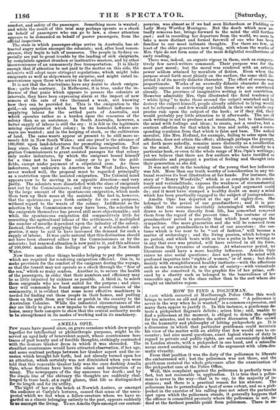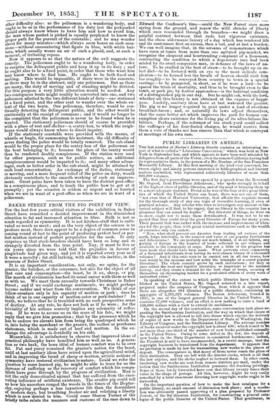HOW TO FIND A POLICEMAN.
A CASE which, occurred at Marlborough Police Office this week brings to notice an old and perpetual grievance. "A policeman is never in the way when he is wanted," is a common expression, and many facts appear to justify it. In this instance, a gentleman de- tects a pickpocket flagrante delicto ; seizes him ; and, usable to find a policeman at the moment, is obliged to detain the culprit for ten minutes and to endure the active discussion of the croWd on the humanity and philosophy of letting pickpockets go. It is a discussion in which that particular gentleman could maintain his view of the matter with an ability that few would care to en- counter; but nice moral questions, exact logical views of duty in regard to private and 130E0 rights, are not conveniently debited in London streets, with a pickpocket in one hand, and a raiseellin neous crowd sustaining its share of the argument with ultra-dra- matic vivacity. From that position it was the duty of the policeman to liberate the embarrassed wit ; but the policeman was not there, and the gentleman restated the whole griqvaoce after the examination of the pickpocket case at the Police Office.
Well, this complaint against the policeman is perfectly true in fact, but not reasonable in application. It is true that a police- man is never in the way—that is to say, in the majority of in- stances; and there is a practical reason for his absence. The policeman has to perambulate a beat of some extent, and as a pick- pocket in the exercise of his calling does not -select the particular spot upon which the policeman stands, it generally happens that the offence is committedpreeisely where the policeman is not in- deed-at the farthest possible point from policeman. There is an-
other difficulty.also : as the policeman is a wandering body, and ought to be so in the performance of his duty lest the pickpocket should always know where to have him and how to avoid him, the man whose pocket is picked is equally perplexed to know the proper path for the pursuit of the constable ; and he may wander about for many minutes—which always seem hours on such occa- sions—without encountering that figure in blue, with white but- tons, which usually wears an air of such a placid, and, at such a moment, of irritating repose. Now it appears to us that the nature of the evil suggests the remedy. The policeman ought to be a wandering body, in order to surprise the delinquent public and keep it up to its duty ; and he ought also to be a fixed point, in order that those who want him may know where to find him. He ought to be both fixed and moving. This would be impossible, if there were in the concrete, as there may be in the abstract, only one policeman. But as there are many, the duty of moving and of standing might be divided. For this purpose a very little alteration would be needed. Any two contiguous beats might readily be converted into one, and two policemen allotted to the two different kinds of duty—one stationed at a fixed point, and the other sent to wander over the whole ex- tent of the two beats. One policeman, therefore, would be con- tinually detecting the delinquent public, and the other would be continually at the receipt of summons ; and it would no longer be the complaint that the policeman is never to be found when he is wanted. The stationary policeman should of course be provided with a place of rest and shelter—a sentry-box, to which the neigh- bours would always know where to direct inquiry.
If the stationary constable were provided with the means, of whistle or bugle, for summoning his assistant, the old difficulty of never finding the police would be totally removed. The cab-stand would be the proper place for the sentry-box of the policeman on the beat belonging to it; because the place of the sentry would thus be rendered doubly conspicuous. If the station were used for other purposes, such as for public notices, an additional conspicuousness would be imparted to it; and many other advan- tages, such as better order in the cab-stand, might be attained by such local concentration. An exchange of the duties, stationary or moving, and a more frequent relief of the police on duty, would obviously contribute to the smooth working of such an improve- ment. Great pains have been taken to have the district post-office in a conspicuous place, and to teach the public how to get at it promptly ; yet the occasion is seldom so urgent and so hurried when we are in want of a post-office as when we are in want of a policeman.



































 Previous page
Previous page